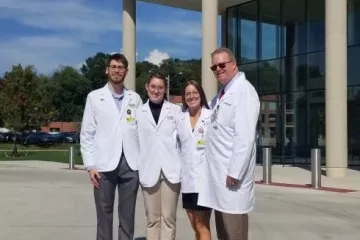Heritage College of Osteopathic Medicine News
Popular Topics
Search College of Medicine Stories
Upcoming Events
Tuesday, April 16
Wellness Committee - Support Group
12:00 PM — 12:45 PM
Medical Education Center (MEC)
Tuesday, April 16
Pediatrics - Pediatric Match Day Virtual Panel
4:00 PM — 5:00 PM
Tuesday, April 16
Medical Spanish Club - Medical Spanish Practice Patient Dinner
5:00 PM — 7:00 PM
HCOM Cleveland Campus
Tuesday, April 16
Cardiothoracic Club - Dodgeball Tournament Fundraiser
6:00 PM — 8:00 PM
Charles J. Ping Student Recreation Center


